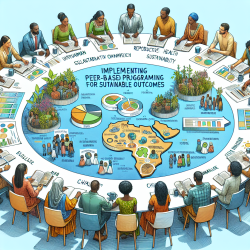Implementing Peer-Based Programming for Sustainable Outcomes
The TESFA program in Ethiopia has demonstrated a successful model for implementing peer-based programming that is both sustainable and scalable. By focusing on reproductive health and economic empowerment, TESFA has created lasting improvements in the lives of adolescent girls, particularly in mitigating the harmful effects of child marriage.
TESFA's approach involved organizing girls into peer-based solidarity groups where they received tailored curricula on sexual and reproductive health (SRH) and economic empowerment (EE). The program also engaged community stakeholders, including husbands and mothers-in-law, in Social Analysis and Action (SAA) groups to address social barriers and support positive health and economic outcomes.
Key Findings from TESFA
Research conducted four years after the program's conclusion revealed several promising outcomes:
- 88% of the original groups continued to meet without ongoing assistance from CARE.
- Some participants spontaneously replicated the TESFA model, forming new groups.
- Improvements in reproductive health knowledge and behaviors, such as contraceptive use and institutional delivery, were sustained over time.
These findings highlight the program's potential for long-term impact and scalability, offering valuable insights for practitioners looking to implement similar peer-based approaches.
Recommendations for Practitioners
Based on TESFA's success, practitioners can consider the following strategies to enhance the sustainability and scalability of peer-based programs:
- Create Environments of Solidarity: Foster strong group dynamics and a sense of sisterhood among participants to encourage continued engagement and support.
- Engage Community Stakeholders: Involve key community members, such as husbands and elders, to create supportive environments for program participants.
- Offer Culturally Relevant Curriculum: Develop curriculum that is contextually appropriate and addresses the specific needs and challenges faced by participants.
- Facilitate Economic Opportunities: Integrate economic empowerment components to provide participants with financial independence and motivation to sustain group activities.
By incorporating these elements, practitioners can design programs that not only achieve immediate outcomes but also foster long-term sustainability and growth.
To read the original research paper, please follow this link: Building sustainable and scalable peer-based programming: promising approaches from TESFA in Ethiopia.










